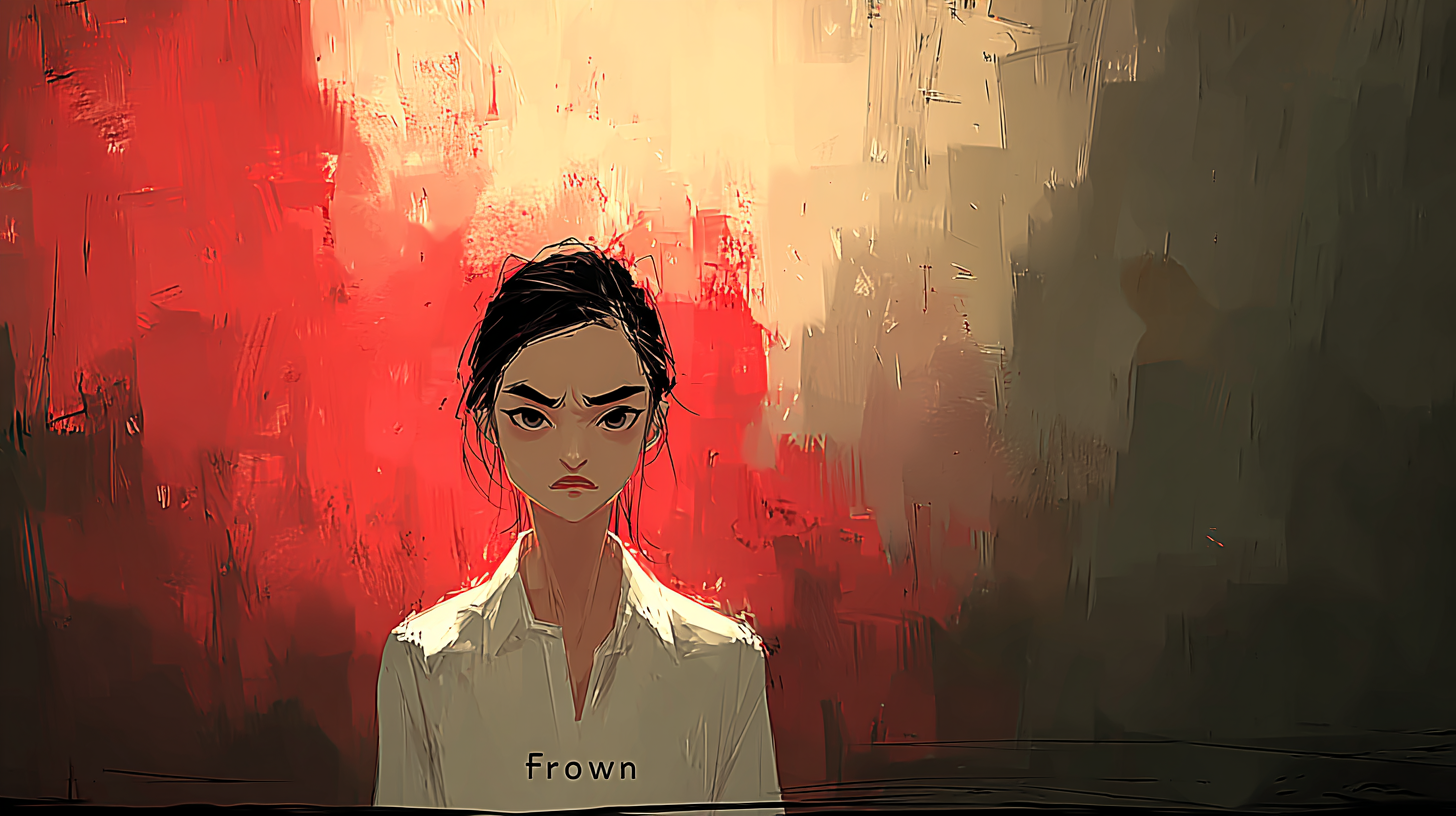“Frown” means to make a serious or unhappy face when you don’t like something.
「frown」は、いやだなと思ったときに顔をしかめることです。
以下は英単語 “frown” に関するストーリー型学習コンテンツです。まずは大枠の意味を理解して最後の文章で確認しましょう。
「frown」の主な意味(main meaning)
| 品詞 | 意味(簡潔) | 発音記号 | 例文 |
|---|---|---|---|
| 動詞 | 眉をひそめる | /fraʊn/ | She frowned when she saw the mess. |
| 名詞 | しかめっ面 | /fraʊn/ | His frown showed he was unhappy. |
「frown」の語源(etymology)
「frown」は中英語 frounen から来ており、古フランス語 frognier(鼻をしわめる) に由来します。
→ コアのイメージは「顔をしかめる、怒った表情をする」
「frown」の類義語(synonyms)
| 類義語 | 例文 |
|---|---|
| scowl | He scowled at the noisy children. |
| glare | She glared at him angrily. |
| grimace | He made a grimace when he tasted the sour lemon. |
| pout | She pouted when she didn’t get her way. |
| glower | He glowered at the interruption. |
「frown」の反義語(antonyms)
| 反義語 | 例文 |
|---|---|
| smile | She smiled when she saw her friend. |
| grin | He grinned with joy after winning. |
「frown」のコロケーション(collocations)
| コロケーション | 例文 |
|---|---|
| frown deeply | He frowned deeply at the bad news. |
| slight frown | A slight frown appeared on her face. |
| frown of confusion | He had a frown of confusion during the test. |
| frown in disapproval | The teacher frowned in disapproval. |
| frown suddenly | She frowned suddenly after reading the message. |
「frown」の2項表現(binomials)
| 表現 | 例文 |
|---|---|
| frown and sigh | He could only frown and sigh at the mistake. |
| smile and frown | People smile and frown in different situations. |
英語ストーリー(english story)
“The Meeting Room Dilemma”
Tom walked into the meeting room and noticed something was wrong. The projector wasn’t working, and the charts he needed were missing. He frowned deeply. His colleague, Sarah, saw his frown of confusion and asked if everything was alright.
“I prepared everything last night,” Tom said with a grimace.
“Maybe someone moved the files,” Sarah suggested.
Tom could only frown and sigh. This was an important presentation.
He walked to the manager’s office. The manager looked up and glared at Tom, not recognizing him immediately.
“Can I ask about the presentation materials?” Tom asked politely.
The manager’s frown turned into a smile. “Ah, you’re Tom. I gave the files to the tech team. Let me get them.”
Soon, the materials were returned. Tom smiled in relief.
“Thank you,” he said, now ready to start.
Sarah whispered, “I thought you were going to scowl forever.”
Tom grinned, “Let’s hope the rest of the day goes better.”
和訳
「会議室のトラブル」
トムは会議室に入ると、何かがおかしいと感じました。プロジェクターが動かず、必要な資料も見当たりません。彼は深く眉をひそめました(frowned deeply)。同僚のサラは彼の**混乱した顔(frown of confusion)**を見て、何か問題があるかと尋ねました。
「昨晩、全部準備したのに」とトムは**しかめっ面(grimace)**をしながら言いました。
「誰かが資料を移動させたのかも」とサラが言いました。
トムはただ**眉をひそめてため息(frown and sigh)をつきました。これは大事なプレゼンでした。
彼はマネージャーのオフィスへ行きました。マネージャーは顔を上げて、トムを知らないようににらみ(glared)**つけました。
「プレゼンの資料についてお聞きしたいのですが」とトムが丁寧に尋ねました。
マネージャーの**しかめっ面(frown)が笑顔(smile)**に変わりました。「ああ、君がトムか。資料は技術チームに渡してあるよ。すぐに持ってこよう。」
やがて資料は戻ってきました。トムは安心して微笑みました(smiled)。
「ありがとうございます。これで準備完了です。」
サラが小声で言いました。「ずっと**にらんで(scowl)るのかと思ったわ。」
トムはにっこり笑って(grinned)**言いました。「この後はうまくいくといいね。」
「frown」のQ&A
- Q“frown”と”scowl”の違いは何ですか?
- A
“scowl”は「怒ったような険しい表情」で、より強く攻撃的な印象を与えます。一方、”frown”は混乱や不満、困惑など、広い感情で使われます。
- Q“frown”と”glare”の違いは何ですか?
- A
“glare”は「じっとにらむ」という視線に重点を置いた行為です。”frown”は顔の筋肉を使って表情を変える動作で、視線に限りません。
- Q“grimace”は”frown”と同じ意味ですか?
- A
部分的に似ていますが、”grimace”は痛みや不快感からくる「ゆがんだ表情」に使われることが多く、”frown”より限定的です。
- Q“smile”は”frown”の正反対の意味ですか?
- A
はい、”smile”は「にっこり笑う」、”frown”は「しかめっ面をする」で、感情の正反対を表す単語です。
- Q“grin”も”frown”の反対語にあたりますか?
- A
はい、”grin”は「にっこりと嬉しそうに笑う」で、”frown”のネガティブな表情とは逆の意味です。
- Q“frown deeply”はどんな時に使いますか?
- A
大きなショックや不満、心配ごとがあるときに使われます。例:試験の結果を見て”frown deeply”。
- Q“slight frown”とはどういう意味ですか?
- A
「わずかなしかめっ面」という意味で、軽い不満や気になることがあるときに使われます。
- Q“frown of confusion”はどんな場面で使いますか?
- A
何かが理解できない、混乱したときに使われます。例:難しい説明を聞いたときの反応など。
- Q“frown in disapproval”の意味は何ですか?
- A
「良くないと思って眉をひそめる」という意味です。誰かの行動や意見に賛成できないときに使います。
- Q“frown suddenly”はどんな時に使われますか?
- A
急に悪いニュースを聞いたり、思いがけないことに出会って、反射的にしかめっ面をする場面で使われます。
【frown と類義語のニュアンス比較表】
| 単語 | 意味の概要 | ニュアンス・使われ方の違い(frownとの違い) | 例文・使用場面 |
|---|---|---|---|
| frown | 眉をひそめる、しかめっ面をする | 不満・心配・困惑を表す表情。軽めの否定的感情を示す際に用いられる | She frowned when she heard the news. |
| scowl | にらみつけるようなしかめっ面をする | frown より強い敵意・怒りを込めた表情。攻撃的・感情的な場面で使われる | He scowled at the noisy children. |
| glare | にらむ、怒りの目つきで見る | 目で相手を強くにらむ行為。表情ではなく「視線」にフォーカスがある | She glared at him across the room. |
| pout | ふくれっ面をする | 口をとがらせる表情。怒りよりも拗ねた・不満そうな感情が込められる | The child pouted when she didn’t get the toy. |
💡補足:
- frown は「感情表現としての眉の動き」で、心配や同意できない感情に使われることが多い。
- scowl はさらに強い怒りを伴い、glare は目線中心の行動、pout は口を使った軽い不満表現。
【frown と類義語のニュアンス比較表】
| 単語 | 意味の概要 | ニュアンス・使い分けのポイント | 例文・使用場面 |
|---|---|---|---|
| frown | 眉をひそめる、しかめっ面をする | 軽い不満・困惑・心配を表す。声に出さず表情でネガティブな感情を示す。 | She frowned when she saw the mistake. |
| scowl | にらみつけるようなしかめっ面をする | 怒り・敵意を含む強めのしかめっ面。frownより強い表情。 | He scowled at the noisy students. |
| glare | にらむ、怒りを込めてじっと見る | 表情ではなく「視線」にフォーカス。怒り・敵意・圧力をこめて睨みつける行動。 | She glared at him across the room. |
| pout | 口をとがらせる、ふくれる | 拗ねる・子どもっぽい不満表現。怒りというより軽い不満や不機嫌な気持ちを示す。 | The child pouted when she didn’t get her way. |
💡補足:
- frown は「静かな不満」や「困惑」など、内面的な感情を眉の動きで示す表現。
- scowl は明確な怒り・敵意を込めた強い表情。
- glare は視線の鋭さに焦点があり、目でにらむ行為。
- pout は口の形を使った軽い不機嫌さやスネた気持ち。



コメント